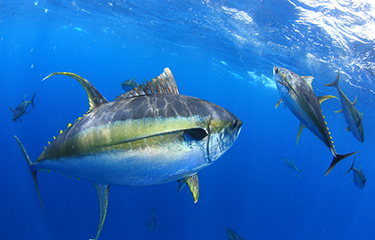E.U. Fisheries Commissioner Virginijus Sinkevičius has been warned by members of the scientific community that Indian Ocean yellowfin tuna is being overfished by the industrial fleet of the E.U. and other nations.
In a letter sent to Sinkevičius dated 16 March, 13 leading fisheries scientists call out the E.U. on its continued overfishing of Indian Ocean yellowfin tuna as well as its denial of the scientific evidence that points to the stock being in danger of collapse. Additionally, the scientists argued that the recovery measures implemented to reduce catches in the region and to protect the stock are inadequate and ineffective.
Thirty-one nations, including many developing countries, and millions of consumers depend on the Indian Ocean yellowfin tuna stock, prompting the scientist collective to urgently issue its letter to the commissioner. The letter stated that “at least one stock analysis – one the Commission chooses not to rely on – says that it could be collapsed, perhaps never to recover, in six years.”
By not taking appropriate immediate action, the letter suggested that the E.U. is being “grossly irresponsible” and in breach of the Common Fisheries Policy (CFP) principle to influence fishery management in the direction of taking urgent action when there is a definable risk of stock collapse.
“We want to ensure that the Commissioner is aware that the future of the stock and industry hang in the balance and urge that he instruct his negotiators to implement a real cut of at least 25 percent in fishing levels in the forthcoming Indian Ocean Tuna Commission (IOTC) negotiations, in keeping with scientific advice,” according to the letter.
The letter also called out regional fisheries management organizations (RFMOs) for their “mismanagement of the sea” and said that there is no justification for trusting them to do the right thing. It advised that the “failure of the IOTC” as an institution to take commensurate and effective action to control fishing mortality is one of the reasons why the poor track record of RFMOs will be highlighted at the forthcoming meeting of the United Nations conference on biodiversity protection beyond national jurisdiction.
“It is a failure that in our view the E.U. should take a lead to rectify, rather than hiding behind the interests of some of its largest commercial stakeholders,” the letter stated.
In 2016, IOTC adopted an interim plan for rebuilding the yellowfin stock, with catch limitations based on 2014/2015 levels. However, the letter stated that instead of achieving the 20 percent reduction in yellowfin catch recommended by scientists at the time, catches increased by 3 percent in 2017, and by around 9 percent in 2018.
“The plan is clearly not working,” the scientists said.
Furthermore, a stock projection model applied to yellowfin tuna in 2018 found that continuing to fish at this increased level could precipitate the collapse of the Indian Ocean yellowfin tuna stock by 2026, the letter noted.
“The E.U. is by far the biggest player when it comes to fishing for tropical tuna in the Indian Ocean and has a legal and moral responsibility to ensure that this globally important stock receives the protection that it deserves,” it said.
The 24th session of the IOTC is scheduled to take place in Bali, Indonesia in June.
Photo coutesy of Al McGlashan/Shutterstock







